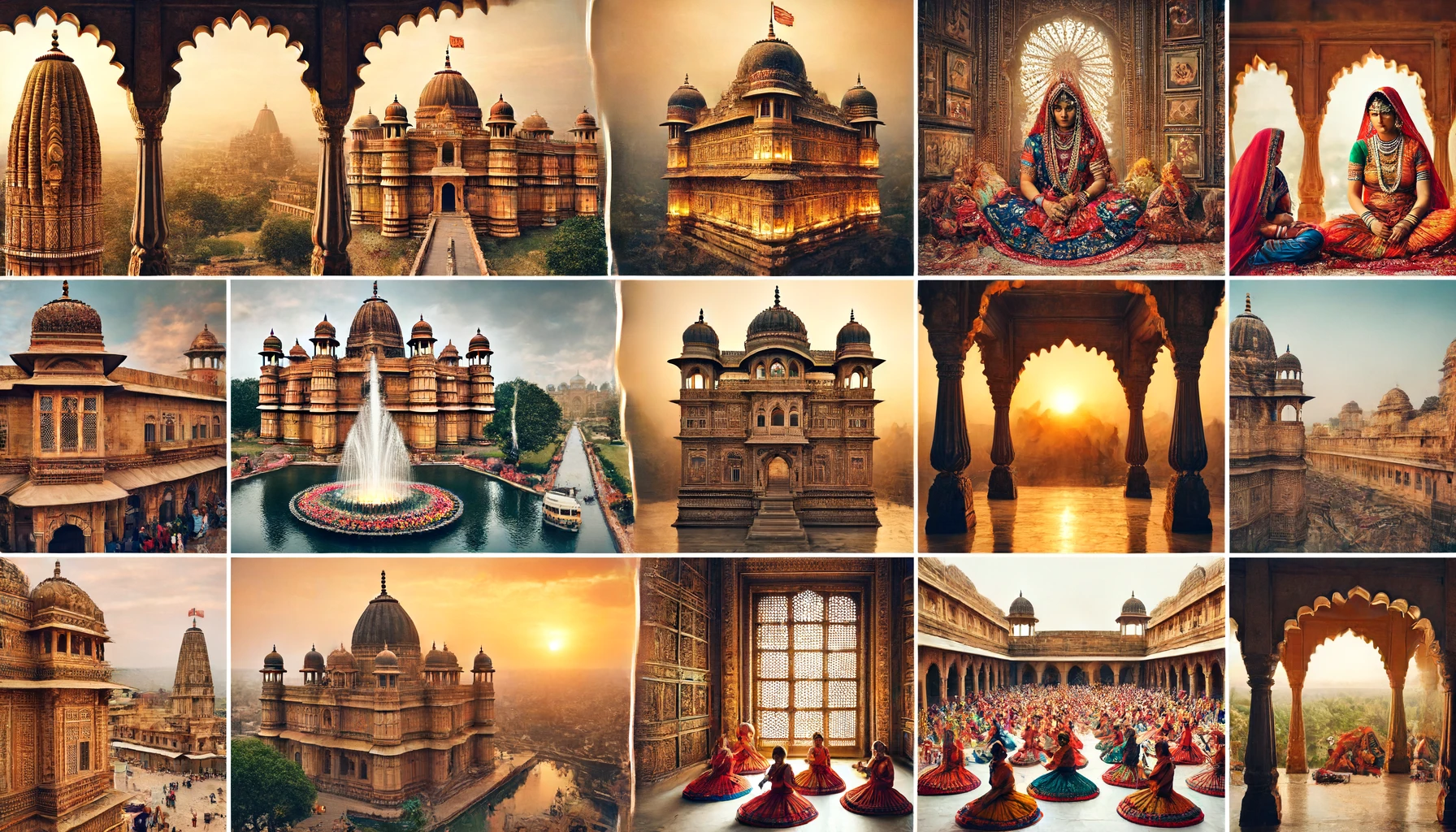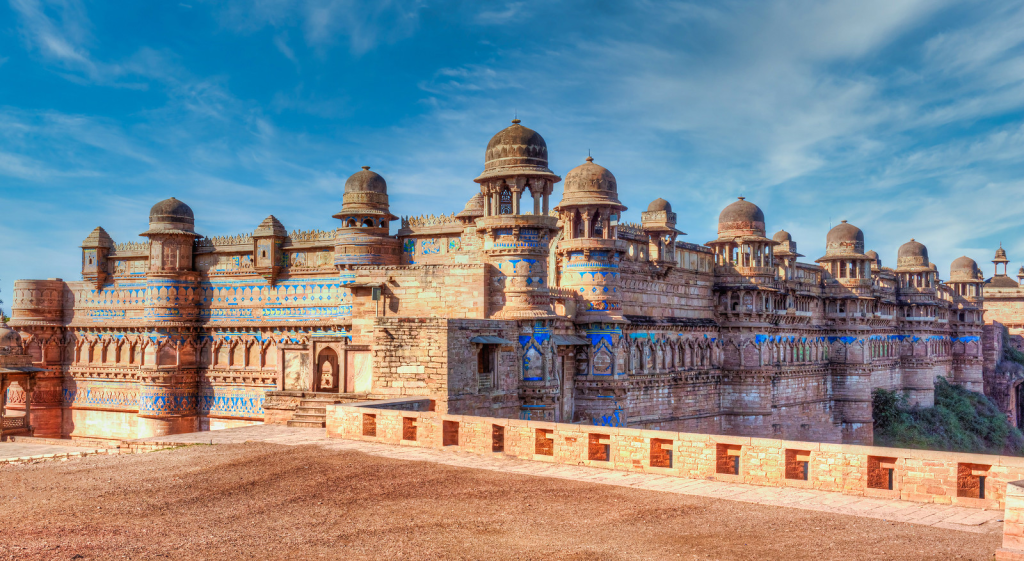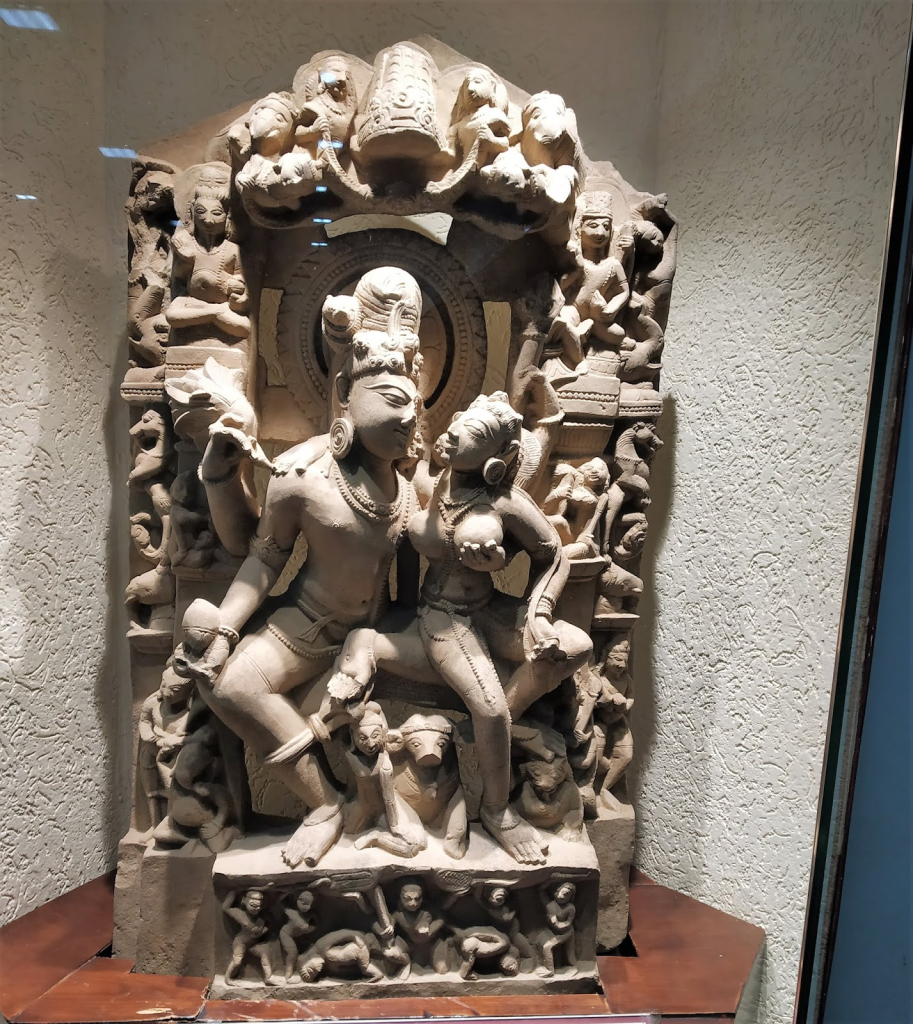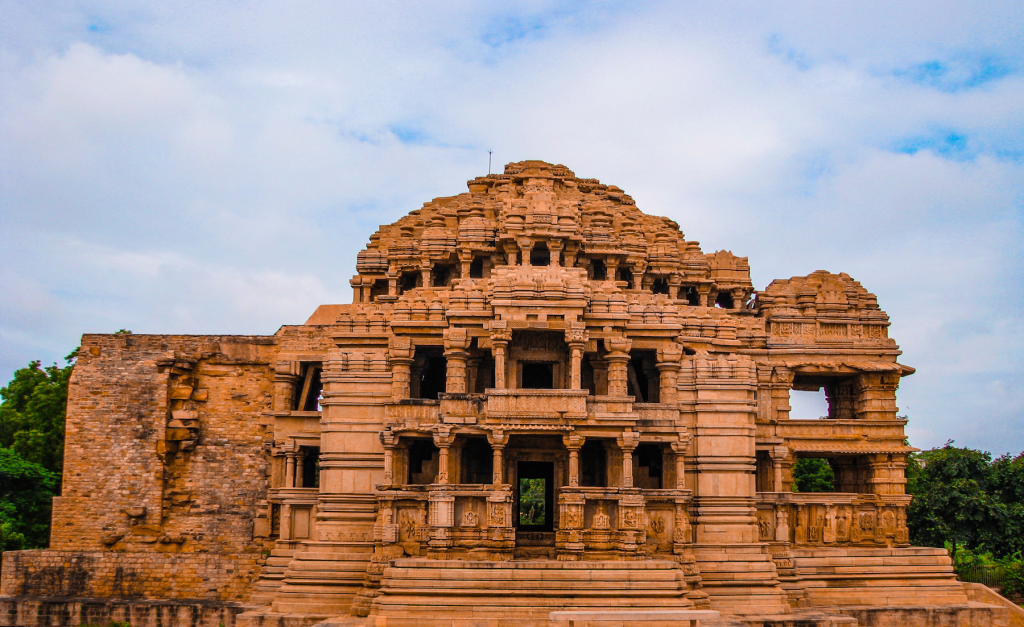Upgrade & Secure Your Future with DevOps, SRE, DevSecOps, MLOps!
We spend hours scrolling social media and waste money on things we forget, but won’t spend 30 minutes a day earning certifications that can change our lives.
Master in DevOps, SRE, DevSecOps & MLOps by DevOps School!
Learn from Guru Rajesh Kumar and double your salary in just one year.

Introduction to Gwalior
Brief History of Gwalior:
Gwalior, a historic city in the heart of India, boasts a legacy that blends deep-rooted antiquity with the march of modernity. The city’s history is rich with tales of heroism and chivalry, pivotal in shaping the region’s identity over centuries. It is said to have been founded by the chieftain Suraj Sen, who named it after the sage Gwalipa, who cured him of leprosy. The city has seen the rule of several significant dynasties, including the Tomars, Mughals, Marathas, and finally the Scindias, each leaving behind a rich tapestry of architectural and cultural heritage.
Cultural Significance:
Gwalior is renowned for its substantial contributions to Indian classical music and arts. It is the birthplace of the legendary musician Tansen, and hosts the annual Tansen Music Festival, attracting classical music enthusiasts globally. The city’s art scene, enriched through centuries, reflects a blend of various dynastic influences and local craftsmanship. Gwalior’s culture is also manifested in its festivals, language, and exquisite handicrafts, such as Gwalior stone carvings.
Geographical Context:
Located in the northern part of Madhya Pradesh, Gwalior stands out with its striking natural landscape dominated by rocky hills encircling the city, providing a natural fortification that was strategically advantageous in ancient times. The city experiences a sub-tropical climate, with marked variations in temperature and seasonal monsoon rains influencing the best times for tourism. Geographically, Gwalior’s position makes it a pivotal gateway to the broader region of North India, easily accessible from major cities like Delhi and Agra, enhancing its appeal as a tourist and cultural hub.
Getting to Gwalior
Gwalior is well-connected by air, rail, and road, making it easily accessible from various parts of India. Below is a detailed guide on how to reach Gwalior:
| Mode of Transport | Details | Booking Options |
|---|---|---|
| Air | Nearest Airport: Rajmata Vijaya Raje Scindia Air Terminal (Gwalior Airport) Serves domestic flights to major cities like Delhi, Mumbai, and Kolkata. | Book flights via airline websites like IndiGo, Air India, or through travel portals like MakeMyTrip, Yatra, or Cleartrip. |
| Train | Main Railway Station: Gwalior Junction Major trains include the Bhopal Shatabdi, Taj Express, and the Gwalior Intercity. It’s well-connected to Delhi, Mumbai, Kolkata, and other major cities. | Tickets can be booked through the Indian Railway Catering and Tourism Corporation (IRCTC) website or app. |
| Road | Major Road Routes: – National Highway 44 connects Gwalior to major cities like Delhi and Agra. – National Highway 46 links it to cities in South and West India. | Bus tickets can be booked on state-run services through portals like RedBus or directly at the bus stations. Private car rentals are available via Zoomcar, Revv, or local rental agencies. |
| Local Transportation | Auto-rickshaws, cycle rickshaws, and city buses are widely available. Taxis can be booked through apps like Ola and Uber for more comfort. | Use local transport apps or hire directly on the streets. Buses can be boarded from major bus stops throughout the city. |
Best Time to Visit Gwalior
To help you plan your visit, here’s a table detailing the seasonal considerations and local festivals that highlight the best times to explore Gwalior:
| Season | Months | Weather | Recommended Activities |
|---|---|---|---|
| Winter | October to March | Cool and comfortable with temperatures between 5°C to 25°C. | Ideal for sightseeing, attending festivals, and exploring outdoor attractions. |
| Summer | April to June | Hot, with temperatures reaching up to 45°C. | Early morning or late evening visits to avoid the heat; explore indoor museums and palaces. |
| Monsoon | July to September | Moderate to heavy rainfall. | Nature walks post-rain for lush scenery; carry rain gear for outdoor activities. |
| Local Festivals and Events | Month | Highlights |
|---|---|---|
| Tansen Music Festival | December | A classical music festival honoring the legendary musician Tansen, featuring performances by renowned artists. |
| Gwalior Trade Fair | December to January | A large-scale fair with exhibits ranging from handicrafts to electronics, along with cultural performances. |
| Rang Panchami | March-April | A vibrant festival where locals engage in playing with colors, celebrated five days after Holi. |
This table offers a snapshot of Gwalior’s climate across different seasons and highlights key cultural events, providing travelers with essential information to plan a well-timed and enjoyable visit.
Major Attractions in Gwalior
Gwalior is a treasure trove of historical and natural sites that reflect its rich past and vibrant cultural landscape. Here are some of the must-visit attractions:
Forts and Palaces
- Gwalior Fort: Often described as the ‘pearl amongst fortresses in India,’ this imposing structure dates back over a thousand years. The fort dominates the city’s skyline and offers stunning views and an insight into the region’s history.

- Jai Vilas Palace: This opulent palace is a fine example of European architecture mixed with Indian elements, built by the Scindia dynasty. It now houses the Jai Vilas Museum, showcasing the royal family’s extravagant possessions.

Museums
- Gwalior Archaeological Museum: Located in the fort itself, this museum hosts a collection of artifacts that trace the region’s history from ancient to modern times, including sculptures, coins, and pottery.

- Jivaji Rao Scindia Museum: Situated within the Jai Vilas Palace, it displays a rich collection of swords, manuscripts, and other royal memorabilia that illustrate the life of the Maratha rulers.

Religious Sites
- Sun Temple: Modeled on the famous Sun Temple of Konark in Odisha, this relatively modern temple is dedicated to the Sun God and is admired for its architecture and serene ambiance.

- Sas Bahu Temple: Despite its name suggesting a temple dedicated to a mother-in-law and daughter-in-law, it’s actually a short form of ‘Sahastrabahu,’ a depiction of Lord Vishnu with a thousand arms. This 11th-century temple is renowned for its intricate carvings and architecture.

- Teli Ka Mandir: This 9th-century temple, located within the Gwalior Fort, is the tallest and most stunning temple of Gwalior, known for its unique blend of Dravidian and Indo-Aryan architectural styles.

Natural Spots
- Tigra Dam: This dam is not only a vital source of water for the city but also a popular spot for picnics and water activities. The surrounding area is scenic and ideal for relaxation.

- Madhav National Park: Although located a bit outside Gwalior, it’s a worthwhile visit for wildlife enthusiasts. The park is home to deer, leopards, and numerous bird species, and offers a tranquil escape into nature.

Cultural Experiences in Gwalior
Gwalior is not just a city of historical monuments but a vibrant hub of arts, crafts, and cultural festivities. Here’s a detailed look at the cultural experiences that visitors can enjoy:
Local Arts and Crafts
- Stone Carving: Gwalior is renowned for its exquisite stone carvings, a craft that has been passed down through generations. The local sandstone, soft yet durable, is intricately carved into statues, ornaments, and architectural fittings.
- Gwalior Handlooms: The city is also famous for its hand-woven textiles, especially the Gwalior Chanderi saris. These are known for their fine silk fabric adorned with zari (gold thread) and traditional motifs.
- Doll Making: Another interesting craft is the making of dolls dressed in traditional attire, reflecting the multicultural heritage of the region.
Traditional Music and Dance Forms
- Classical Music: Gwalior is considered one of the oldest gharanas (a system of social organization linking musicians or dancers by lineage or apprenticeship, and by adherence to a particular musical style) in Indian classical music. The Gwalior Gharana has significantly shaped the Hindustani classical music tradition and continues to influence new generations of musicians.
- Folk Dances: Folk dances such as Rai, which involves graceful movements and vibrant costumes, are part of local festivities and celebrations, depicting tales of historical and cultural significance.
Must-See Cultural Performances or Places
- Tansen Music Festival: This annual event is a must-visit for anyone interested in classical music. Held near the tomb of Tansen, one of the ‘nine jewels’ in Emperor Akbar’s court, the festival attracts prominent classical musicians from across India, offering spellbinding performances under the stars.
- Gwalior Trade Fair: Although primarily a commercial event, the fair is also a cultural showcase, with performances of traditional dance, music, and drama. It offers a glimpse into the vibrant local culture and provides an opportunity for visitors to engage with artisans and performers directly.
- Rangayana: If you’re interested in theatre, Rangayana is a theatre festival that brings together various dramatic troupes from across the country to perform in Gwalior, displaying a wide array of theatrical styles and narratives.
Food and Dining in Gwalior
Gwalior’s culinary scene offers a delightful mix of flavors that are deeply rooted in the regional culture and influenced by the city’s storied history. Here’s a detailed guide to help you explore the best of local cuisine:
| Aspect | Details |
|---|---|
| Overview of Local Cuisine | Gwalior’s cuisine is a blend of North Indian flavors with a special emphasis on sweets and snacks. The city’s royal history is reflected in its rich, flavorful dishes often cooked with a generous use of ghee (clarified butter) and spices. |
| Recommendations for Restaurants | – Silver Saloon: Located in Usha Kiran Palace, this restaurant offers royal recipes that were once part of the princely state’s kitchen. – Indian Coffee House: An old-time favorite known for its consistent quality in traditional Indian snacks. – Swad Restaurant: Famous for its authentic local and North Indian dishes. |
| Recommendations for Street Food Spots | – S.S. Kachoriwala: Famous for their spicy kachoris. – Bahadura Sweets: Known for a variety of traditional sweets. – Dilli Parathe Wala: Offers a range of stuffed parathas, a must-try for breakfast or evening snack. |
| Famous Dishes to Try | – Gajak: A dry sweet made of sesame seeds and jaggery, especially popular during the winter months. – Bedai: A spicy snack consisting of a fried puffy bread served with a bowl of spicy sabzi. – Morena Gajak: While originating from Morena, a town near Gwalior, it’s widely available and cherished in the city. – Poha Jalebi: A common breakfast where poha (flattened rice) is served with sweet jalebis. |
Shopping in Gwalior
Gwalior offers a vibrant shopping experience with its bustling markets, rich handicrafts, and unique souvenirs. Here’s a detailed guide to the best places for shopping, local specialties, and souvenir ideas:
Best Places for Shopping
- Patankar Bazaar: Ideal for handicrafts, jewelry, and fabrics. This bustling market gives you a taste of the local shopping culture.
- Sarafa Bazaar: Known for its silver and gold jewelry. It’s also a great place to buy Gwalior’s famous Chanderi and Maheshwari silk fabrics.
- Dindayal City Mall: For a more contemporary shopping experience with branded stores and eating outlets, this mall offers a modern twist to shopping in Gwalior.
Local Specialties and Handicrafts to Look Out For
- Gwalior Stone Carvings: These intricate carvings are a specialty in Gwalior, perfect for decorative items and gifts.
- Chanderi and Maheshwari Sarees: These exquisite silk and cotton sarees, known for their fine texture and vibrant patterns, are a must-buy for anyone visiting Gwalior.
- Lacquerware: Brightly colored lacquerware items, such as bangles and other ornaments, are beautiful and unique to the region.
Souvenir Suggestions
- Gajak: This local sweet made from sesame seeds and jaggery is famous in Gwalior and makes for a perfect edible souvenir.
- Handcrafted Dolls: These dolls dressed in traditional attire are not just toys but a piece of the local culture and art.
- Leather Products: Gwalior is also known for its leather products, including shoes, bags, and belts, which are of high quality and durability.
Accommodations in Gwalior
Gwalior offers a wide range of accommodation options to suit various budgets and preferences. Here’s a detailed guide to help you find the perfect place to stay:
| Category | Details | Recommendations Based on Areas/Districts |
|---|---|---|
| Budget | Affordable options with basic amenities for budget-conscious travelers. | Lashkar: Close to the main market and railway station. Phool Bagh: Convenient and affordable stays near the park. |
| Mid-Range | Comfortable stays with additional amenities like complimentary breakfast and Wi-Fi. | Lashkar: Mid-range hotels offering easy access to major attractions. City Center: A balance of comfort and cost, ideal for tourists. |
| Luxury | High-end hotels and resorts offering premium services, luxury amenities, and unique experiences. | Madhav Rao Scindia Marg: Known for luxury hotels and proximity to historical sites. City Center: Upscale hotels with modern facilities. |
| Unique Stays | Heritage hotels and boutique stays offering a unique and memorable experience. | Gwalior Fort Area: Heritage hotels with historical charm. Usha Kiran Palace: A Taj property offering a luxurious heritage stay. |
Recommendations for Unique Stays
- Usha Kiran Palace: A heritage hotel by Taj Hotels offering royal suites, fine dining, and lush gardens.
- Deo Bagh: A boutique heritage hotel featuring Maratha architecture, beautiful courtyards, and serene surroundings.
- Neemrana’s Deo Bagh: Known for its historic charm and tranquil atmosphere, offering a unique stay experience in Gwalior.
Day Trips and Excursions from Gwalior
Gwalior serves as a perfect base for exploring nearby attractions, offering a range of day trips and excursions that highlight the region’s rich history and natural beauty. Here are some recommendations:
Nearby Places of Interest
- Shivpuri
- Distance from Gwalior: 120 km
- Highlights: Famous for its national park, Madhav National Park, and the Chhatris (cenotaphs) of the Scindia dynasty.
- Activities: Wildlife safaris, bird watching, and exploring historic structures.
2. Datia
- Distance from Gwalior: 75 km
- Highlights: Known for the majestic Datia Palace (Bir Singh Palace), a stunning example of 17th-century architecture.
- Activities: Exploring the palace, visiting the nearby Sonagir Jain temples.
3. Orchha
- Distance from Gwalior: 120 km
- Highlights: Home to the beautiful Orchha Fort complex, Jahangir Mahal, and the Ram Raja Temple.
- Activities: Historical sightseeing, river rafting on the Betwa River, and exploring temples.
4. Sonagiri
- Distance from Gwalior: 60 km
- Highlights: A pilgrimage site for Jains, with numerous white marble temples spread across the hill.
- Activities: Pilgrimage visits, exploring the serene temple complex.
Organized Tours and Independent Trip Ideas
| Destination | Tour Type | Description |
|---|---|---|
| Shivpuri | Organized Tour | Full-day guided tour including Madhav National Park safari and visit to Chhatris. |
| Datia | Independent Trip Idea | Self-drive or hire a taxi for a day trip to explore Datia Palace and nearby temples. |
| Orchha | Organized Tour | Day-long guided tour covering Orchha Fort, Jahangir Mahal, and temple visits. |
| Sonagiri | Independent Trip Idea | Easy self-drive or taxi hire to explore the peaceful Jain temple complex. |
Recommended Tour Operators
- Madhya Pradesh Tourism: Offers a variety of day tours and packages to nearby attractions.
- Private Tour Operators: Numerous local operators provide customizable tours based on your interests and schedule.
Travel Tips
- Early Start: Begin your day trips early to make the most of the daylight hours and avoid afternoon heat.
- Local Cuisine: Try local eateries during your excursions to get a taste of regional specialties.
- Comfortable Clothing: Wear comfortable clothing and footwear suitable for walking and exploring historical sites.
Travel Tips and Hacks for Gwalior
To ensure a smooth and enjoyable visit to Gwalior, here are some essential travel tips and hacks presented in a tabular format:
| Category | Tips and Hacks |
|---|---|
| Safety Tips | – Stay Alert: Keep an eye on your belongings, especially in crowded places. – Emergency Contacts: Keep a list of emergency numbers, including local police and your country’s embassy. – Safe Transport: Use registered taxis or ride-hailing services like Ola and Uber. – Health Precautions: Carry basic first aid, stay hydrated, and avoid street food if you have a sensitive stomach. |
| Bargaining Tips | – Start Low: Begin negotiations at about half the asking price. – Be Polite: Bargain respectfully and with a smile. – Walk Away: If the price isn’t right, walking away often leads to the vendor calling you back with a better offer. – Know the Market: Familiarize yourself with general prices to avoid being overcharged. |
| Cultural Etiquette | – Dress Modestly: Wear clothing that covers shoulders and knees, especially when visiting religious sites. – Respect Traditions: Remove shoes before entering temples or homes. – Right Hand Rule: Use your right hand for giving and receiving items. – Public Displays: Avoid public displays of affection, which are considered inappropriate. |
| Useful Local Phrases | – Greetings: “Namaste” (Hello) – Thank You: “Dhanyavad” – How Much?: “Kitne ka hai?” – Yes/No: “Haan” / “Nahin” – Where is…?: “Kahan hai…?” – Help!: “Madad!” – Please: “Kripya” |
Interactive Map and Itineraries for Gwalior
Downloadable Map
An interactive and downloadable map can be created using Google My Maps or similar tools, marking all major attractions, eateries, and stay options in Gwalior. This map would include:
- Major Attractions: Gwalior Fort, Jai Vilas Palace, Sun Temple, Sas Bahu Temple, Teli Ka Mandir, Gwalior Archaeological Museum, Jivaji Rao Scindia Museum.
- Eateries: Silver Saloon, Indian Coffee House, Swad Restaurant, S.S. Kachoriwala, Bahadura Sweets, Dilli Parathe Wala.
- Stay Options: Usha Kiran Palace, Deo Bagh, Neemrana’s Deo Bagh, budget hotels in Lashkar, and mid-range hotels in City Center.
To access the map:
- Downloadable Map Link (This link would direct users to the interactive map)
Suggested Itineraries
| Length of Stay | Itinerary |
|---|---|
| 1 Day | Morning: – Visit Gwalior Fort – Explore Man Mandir Palace and Teli Ka Mandir Afternoon: – Lunch at Indian Coffee House – Visit Jai Vilas Palace and Museum Evening: – Stroll through Patankar Bazaar – Dinner at Silver Saloon |
| 3 Days | Day 1: – Follow the 1-day itinerary Day 2: Morning: – Visit Sun Temple and Sas Bahu Temple – Explore Gwalior Archaeological Museum Afternoon: – Lunch at Swad Restaurant – Visit Tansen’s Tomb and Gujari Mahal Evening: – Shop at Sarafa Bazaar – Dinner at Dilli Parathe Wala Day 3: Morning: – Day trip to Orchha or Datia Afternoon: – Explore the palaces and temples Evening: – Return to Gwalior – Dinner at your hotel or a local restaurant |
| 5 Days | Day 1 & 2: – Follow the 3-day itinerary Day 3: Morning: – Day trip to Shivpuri – Visit Madhav National Park and Chhatris Afternoon: – Lunch at a local restaurant in Shivpuri Evening: – Return to Gwalior – Relax and dine at your hotel Day 4: Morning: – Visit Tigra Dam Afternoon: – Return to Gwalior for lunch at Bahadura Sweets – Explore local markets Evening: – Enjoy a cultural performance if available Day 5: Morning: – Free time for leisure or revisit favorite spots – Visit any missed attractions Afternoon: – Last-minute shopping and |
Photography and Drone Policies in Gwalior
Gwalior, with its rich historical sites and vibrant culture, is a great place for photography. However, there are specific guidelines and regulations regarding photography and drone usage to ensure the preservation of these sites and respect for local customs.
| Category | Details |
|---|---|
| Photography Guidelines | – Historical Sites: Photography is generally allowed in most outdoor areas of historical sites like Gwalior Fort, Jai Vilas Palace, and temples. – Museums: Flash photography is usually prohibited in museums to protect artifacts. Always check for specific signage. – Religious Sites: Respect local customs; ask for permission before taking photographs, especially inside temples and of religious ceremonies. – Local People: Always ask for consent before photographing locals, especially in markets and rural areas. |
| Drone Usage Regulations | – General Rules: Drones are subject to strict regulations in India. Operators must have the appropriate permissions and licenses. – Restricted Areas: Flying drones is prohibited over military areas, crowded places, and near airports. – Historical Sites: Drones are not typically allowed at historical and archaeological sites to avoid damage and disturbances. – Permissions: For drone photography, seek permission from local authorities and the Archaeological Survey of India (ASI) when necessary. |
| Additional Tips | – Best Times for Photography: Early morning and late afternoon offer the best lighting conditions. – Equipment Care: Protect your equipment from dust and heat, especially during summer months. – Respect Privacy: Avoid intrusive photography that may offend locals or disrupt their daily activities. |
Emergency Contacts in Gwalior
Having access to emergency contacts and facilities is crucial while traveling. Here’s a comprehensive list of important numbers and places for emergencies in Gwalior:
| Category | Details |
|---|---|
| Local Emergency Numbers | – Police: 100 – Fire Brigade: 101 – Ambulance: 102 – Tourist Helpline: 1363 |
| Medical Facilities | – Gwalior Medical College: Emergency Department: +91 751 232 1120 – Birla Hospital: +91 751 244 1441 – Apollo Spectra Hospitals: +91 751 302 3567 |
| Nearby Hospitals and Pharmacies | – Birla Hospital: Known for comprehensive healthcare services, located at Gwalior Residency Rd, Mahalgaon. – Apollo Spectra Hospitals: Offers specialized medical services, located at City Center, Gwalior. – Medicine Point Pharmacy: 24/7 pharmacy available at Lashkar, Gwalior. |
| Consulates | – British Consulate (New Delhi): For British nationals, nearest consulate in New Delhi, contact: +91 11 2419 2100 – American Consulate (Mumbai): For American nationals, nearest consulate in Mumbai, contact: +91 22 2672 4000 |
Conclusion
Recap of Why Gwalior is a Worthy Destination
Gwalior, with its rich historical tapestry and vibrant cultural landscape, offers an unparalleled experience for travelers. The city’s magnificent forts and palaces, such as the Gwalior Fort and Jai Vilas Palace, provide a glimpse into its regal past, while the serene temples like the Sun Temple and Sas Bahu Temple offer spiritual solace. The local cuisine, bustling markets, and traditional crafts add layers of charm, making Gwalior a multifaceted destination worth exploring.
Personal Anecdotes or Testimonials from Other Travelers
- John from the UK:
“My trip to Gwalior was an unforgettable journey through history. The grandeur of Gwalior Fort left me spellbound, and the intricate stone carvings were truly a sight to behold. The warmth of the locals and the delicious street food added a special touch to my visit. I would highly recommend Gwalior to anyone looking to experience the rich heritage of India.” - Ananya from Mumbai:
“Gwalior was a delightful surprise! The Tansen Music Festival was an extraordinary experience, bringing the city alive with the sounds of classical music. The hospitality at Usha Kiran Palace was exceptional, and the heritage walks around the city were both informative and enchanting. Gwalior is a hidden gem that every traveler should explore.” - Lisa from Australia:
“Exploring the bazaars of Gwalior was one of the highlights of my trip. From vibrant textiles to beautifully crafted jewelry, the markets were a treasure trove. The local cuisine, especially the bedai and gajak, was a treat for my taste buds. Gwalior’s blend of history, culture, and cuisine makes it a must-visit destination.”
Plan your perfect trip to Gwalior with these amazing travel tips! saveplus.ae